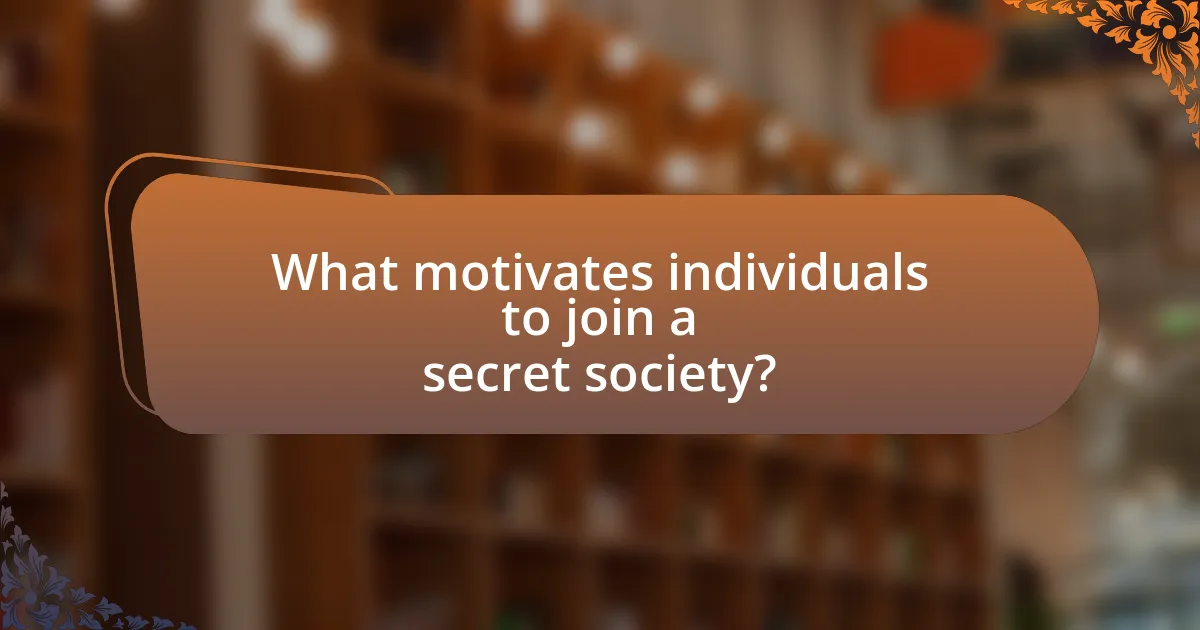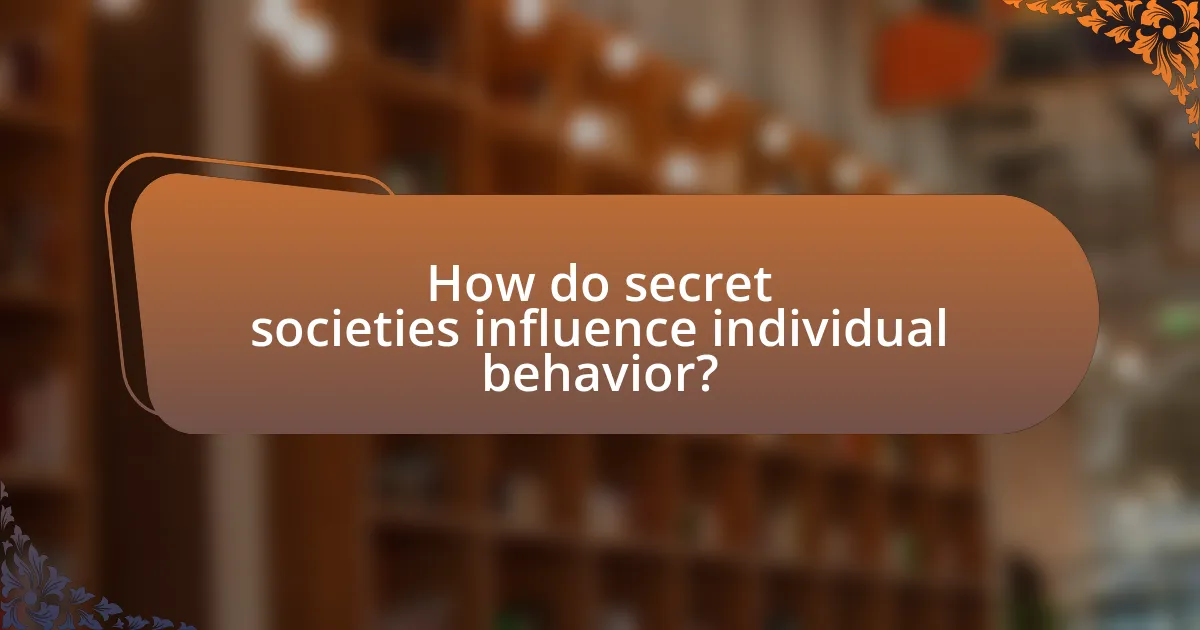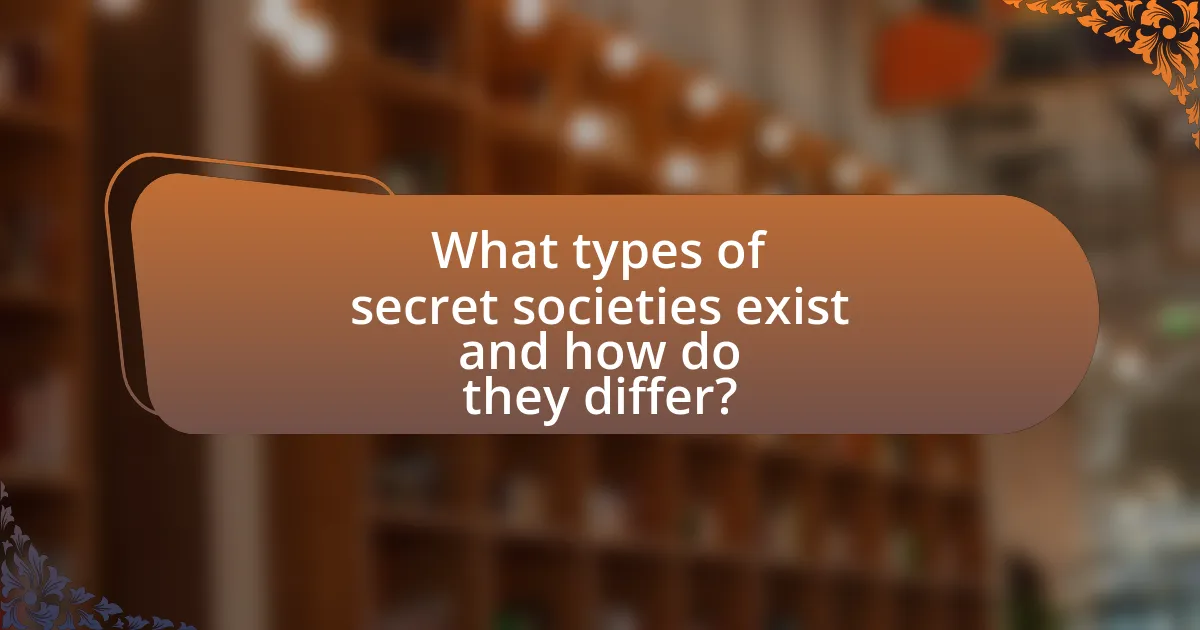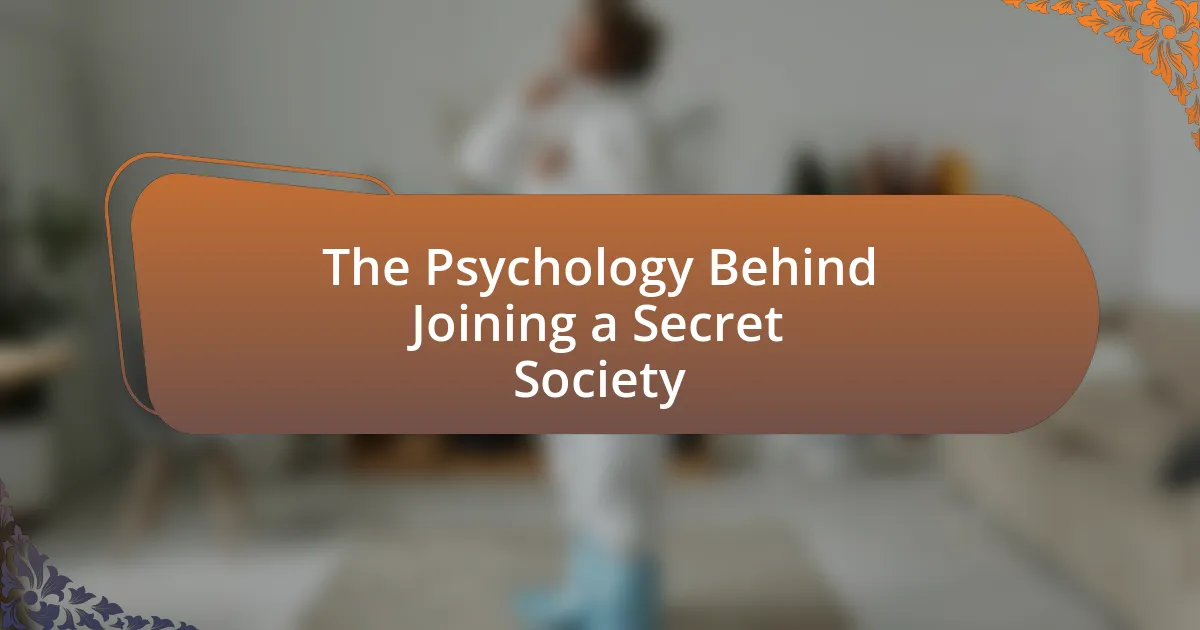The article explores the psychological motivations behind individuals’ decisions to join secret societies, emphasizing the desire for belonging, identity, and community. It discusses how these groups fulfill various psychological needs, such as social validation and the pursuit of insider knowledge, while also examining the role of secrecy and exclusivity in attracting members. Additionally, the article highlights the impact of membership on personal values, beliefs, and social dynamics, as well as the potential risks and benefits associated with involvement in such organizations. Various types of secret societies are categorized, and their historical contexts and influences on significant events are analyzed, providing a comprehensive understanding of the complex interplay between individual psychology and group affiliation.

What motivates individuals to join a secret society?
Individuals are motivated to join a secret society primarily for a sense of belonging and community. This desire for connection often stems from feelings of isolation or the need for social validation. Research indicates that individuals seek out groups that provide shared values, rituals, and exclusivity, which can enhance their identity and self-esteem. For instance, a study published in the Journal of Social Issues highlights that the allure of secrecy and the promise of insider knowledge can significantly attract individuals, as it creates a perception of being part of an elite group. Additionally, the psychological need for power and influence can drive individuals to join, as secret societies often offer networking opportunities that can lead to personal and professional advancement.
How does the desire for belonging influence this decision?
The desire for belonging significantly influences the decision to join a secret society by providing individuals with a sense of identity and community. This psychological need drives people to seek connections with others who share similar values and interests, often leading them to engage in exclusive groups. Research indicates that social belonging is a fundamental human motivation, as highlighted in studies by Baumeister and Leary, which emphasize that the need for belongingness is essential for emotional well-being and can lead to increased self-esteem and fulfillment. Thus, the pursuit of belonging often compels individuals to make the decision to join secret societies, as these groups offer a unique environment for social interaction and acceptance.
What psychological needs are fulfilled by membership in a secret society?
Membership in a secret society fulfills several psychological needs, including the need for belonging, identity, and security. Individuals often seek connection with like-minded peers, which satisfies their social belongingness and fosters a sense of community. Additionally, secret societies provide a unique identity that distinguishes members from the general population, enhancing self-esteem and personal significance. The element of secrecy also contributes to a feeling of exclusivity and security, as members share confidential knowledge and experiences that create trust and loyalty among them. Research indicates that such groups can fulfill these psychological needs by offering social support and a structured environment, which can be particularly appealing during times of personal or societal uncertainty.
How does social identity play a role in joining these groups?
Social identity significantly influences individuals’ decisions to join secret societies by providing a sense of belonging and shared purpose. When individuals identify with a particular group, they often seek out communities that reflect their values, beliefs, and social status, which secret societies can offer. Research indicates that social identity theory posits that people derive part of their self-concept from their group memberships, leading them to join groups that enhance their social identity and fulfill their psychological needs for acceptance and recognition. For instance, studies have shown that individuals are motivated to join groups that reinforce their identity, as seen in the case of elite secret societies at universities, where membership can enhance social capital and prestige among peers.
What role does secrecy play in attracting members?
Secrecy plays a crucial role in attracting members to secret societies by creating an allure of exclusivity and mystery. This allure stimulates curiosity and a desire for belonging among potential members, as individuals are often drawn to experiences that are perceived as unique or hidden from the general public. Research indicates that the human brain is wired to respond positively to the unknown, which can enhance the appeal of joining a group that promises access to secret knowledge or experiences. For instance, studies have shown that exclusivity can increase perceived value, making individuals more likely to seek membership in organizations that maintain a level of secrecy.
Why are individuals drawn to the allure of hidden knowledge?
Individuals are drawn to the allure of hidden knowledge due to a combination of curiosity, the desire for exclusivity, and the psychological thrill associated with secrecy. This attraction is rooted in the human need for understanding and mastery over one’s environment, as well as the social dynamics that elevate the status of those who possess information that is not widely available. Research indicates that the concept of “forbidden knowledge” can enhance its perceived value, making individuals more eager to seek it out. For instance, studies in psychology show that people often find greater satisfaction in acquiring knowledge that is scarce or restricted, as it can confer a sense of power and belonging within exclusive groups.
How does the concept of exclusivity impact the decision to join?
The concept of exclusivity significantly influences the decision to join a secret society by creating a perception of value and desirability. Individuals are often motivated to join exclusive groups because they associate membership with status, prestige, and a sense of belonging to a select community. Research indicates that exclusivity can enhance attraction; for instance, a study published in the Journal of Personality and Social Psychology found that people are more likely to desire membership in groups that are perceived as exclusive, as this exclusivity signals higher social value and enhances self-esteem. Thus, the allure of being part of an elite circle drives individuals to pursue membership in secret societies.
What psychological benefits do members experience?
Members of secret societies experience several psychological benefits, including enhanced social connections, increased self-esteem, and a sense of belonging. These benefits arise from the exclusive nature of such groups, which fosters deep interpersonal relationships and a shared identity among members. Research indicates that belonging to a group can significantly improve mental well-being; for instance, a study published in the Journal of Personality and Social Psychology found that social connections are crucial for emotional health and can lead to lower levels of anxiety and depression. Additionally, the rituals and shared experiences within secret societies can boost members’ self-esteem by providing them with a unique status and purpose, reinforcing their sense of identity and community.
How does participation in a secret society enhance self-esteem?
Participation in a secret society enhances self-esteem by providing individuals with a sense of belonging and validation. Being part of an exclusive group fosters social connections and reinforces personal identity, which are critical components of self-worth. Research indicates that social support and group affiliation can significantly boost self-esteem, as individuals often derive confidence from their association with a respected or elite organization. For instance, studies show that individuals who engage in group activities report higher self-esteem levels due to the affirmation received from peers and the shared experiences that create a strong group identity.
What sense of purpose do members derive from their involvement?
Members derive a sense of purpose from their involvement in secret societies through the fulfillment of belonging, shared values, and the pursuit of knowledge. This sense of belonging fosters a community where individuals feel connected to a larger mission, often centered around ideals such as personal growth, social influence, or altruism. Research indicates that participation in such groups can enhance self-esteem and provide a framework for identity, as members align their personal goals with the collective objectives of the society. For instance, studies show that individuals involved in secret societies often report increased life satisfaction and a stronger sense of meaning in their lives, reinforcing the psychological benefits of their engagement.

How do secret societies influence individual behavior?
Secret societies influence individual behavior by creating a strong sense of belonging and shared identity among members. This social cohesion often leads to conformity, where individuals adopt the beliefs, values, and behaviors promoted by the group. Research indicates that the psychological need for affiliation drives individuals to align their actions with those of their peers, particularly in exclusive environments like secret societies. For example, studies have shown that group dynamics can significantly alter decision-making processes, as individuals may prioritize group consensus over personal beliefs to maintain acceptance within the society.
What are the social dynamics within a secret society?
Social dynamics within a secret society are characterized by exclusivity, hierarchy, and shared rituals. Members often experience a strong sense of belonging and loyalty, which fosters close-knit relationships and reinforces group identity. The hierarchical structure typically involves varying levels of initiation and status, influencing interactions and power dynamics among members. Shared rituals and secrecy create a bond that enhances trust and commitment, as seen in historical examples like the Freemasons, where initiation ceremonies and symbols play a crucial role in member cohesion. These dynamics contribute to the psychological motivations for joining, such as the desire for community, status, and a sense of purpose.
How does groupthink affect decision-making among members?
Groupthink negatively affects decision-making among members by promoting conformity and discouraging dissent. This phenomenon leads to a lack of critical evaluation of alternatives, resulting in poor decisions. Research by Janis (1972) highlights that groupthink can cause members to prioritize harmony over realistic appraisal, often leading to disastrous outcomes, such as the Bay of Pigs invasion, where group cohesion overshadowed sound judgment. Consequently, members may suppress their own opinions, leading to a collective mindset that undermines effective decision-making.
What role does peer pressure play in maintaining loyalty?
Peer pressure significantly reinforces loyalty by creating a strong social bond among members of a group, such as a secret society. This dynamic encourages individuals to conform to group norms and values, fostering a sense of belonging and commitment. Research indicates that individuals are more likely to remain loyal to a group when they perceive that their peers expect them to uphold certain behaviors and beliefs, as demonstrated in studies on group dynamics and conformity, such as those conducted by Solomon Asch. These findings illustrate that the desire to fit in and avoid social rejection can lead to increased loyalty, as members strive to align their actions with the expectations of their peers.
How does membership impact personal values and beliefs?
Membership in a secret society significantly influences personal values and beliefs by fostering a shared identity and reinforcing group norms. Individuals often adopt the values and beliefs of the society to align with its collective ethos, which can lead to a transformation in their worldview. Research indicates that social identity theory supports this phenomenon, suggesting that belonging to a group enhances self-esteem and shapes individual beliefs to match group standards. For example, members of organizations like the Freemasons often report a heightened sense of morality and community responsibility, reflecting the society’s emphasis on ethical conduct and philanthropy. This alignment can result in profound changes in personal values, as individuals prioritize the society’s principles over their previous beliefs.
What changes in worldview can occur after joining?
Joining a secret society can lead to significant changes in worldview, including a shift towards a more collectivist perspective and altered perceptions of trust and secrecy. Members often begin to prioritize group loyalty and shared beliefs over individual viewpoints, fostering a sense of belonging that can reshape their understanding of social dynamics. Additionally, exposure to new ideologies and rituals can challenge previously held beliefs, prompting individuals to reevaluate their moral frameworks and societal norms. Research indicates that such transformations are common in group settings, as social identity theory suggests that individuals often align their beliefs with those of their group to enhance cohesion and identity.
How do secret societies shape moral and ethical perspectives?
Secret societies shape moral and ethical perspectives by creating exclusive environments that promote specific values and beliefs among their members. These organizations often establish a code of conduct that emphasizes loyalty, secrecy, and shared ideals, which can influence individual moral frameworks. For instance, the Freemasons advocate principles such as brotherhood, charity, and integrity, which can lead members to adopt these values in their personal lives. Historical examples, such as the influence of the Illuminati during the Enlightenment, demonstrate how secret societies can challenge prevailing moral norms and encourage progressive thought. This dynamic illustrates that the collective ethos within secret societies can significantly impact the moral and ethical outlook of their members.
What are the potential risks associated with joining a secret society?
Joining a secret society poses several potential risks, including loss of personal freedom, exposure to illegal activities, and damage to personal relationships. Members may find themselves bound by strict codes of secrecy that limit their ability to communicate openly with family and friends, leading to isolation. Additionally, some secret societies may engage in unethical or illegal practices, which can result in legal consequences for members. Historical examples, such as the involvement of certain secret societies in political conspiracies, illustrate the potential for reputational harm and personal jeopardy. Furthermore, the psychological pressure to conform to group norms can lead to compromised personal values and ethical dilemmas.
How can involvement lead to negative psychological outcomes?
Involvement in a secret society can lead to negative psychological outcomes due to increased stress, social isolation, and cognitive dissonance. Members may experience heightened anxiety from the pressure to conform to group norms and secrecy, which can exacerbate feelings of paranoia and mistrust. Research indicates that social isolation, often a consequence of prioritizing group loyalty over personal relationships, can lead to depression and a decline in mental well-being. Additionally, cognitive dissonance arises when individuals struggle to reconcile their personal values with the society’s practices, leading to internal conflict and emotional distress. These factors collectively contribute to adverse psychological effects, as evidenced by studies linking group involvement to mental health issues.
What are the legal and social implications of membership?
Membership in a secret society can lead to significant legal and social implications. Legally, members may face scrutiny under laws governing conspiracy, privacy, and potential criminal activities associated with the society’s operations. For instance, if a society engages in illegal activities, members could be prosecuted or face civil liabilities. Socially, membership can affect personal relationships, as individuals may experience stigma or isolation from those outside the society, leading to a dual identity that complicates social interactions. Research indicates that individuals often join such groups seeking belonging, which can create tension between their public persona and private affiliations, impacting their social standing and mental health.

What types of secret societies exist and how do they differ?
Various types of secret societies exist, including fraternal organizations, religious sects, political groups, and academic societies, each differing in purpose, membership, and rituals. Fraternal organizations, such as the Freemasons, focus on brotherhood and community service, while religious sects, like the Rosicrucians, emphasize spiritual enlightenment and esoteric knowledge. Political groups, such as the Skull and Bones, often engage in elite networking and influence, whereas academic societies, like the Phi Beta Kappa, prioritize scholarly achievement and intellectual discourse. These differences highlight the diverse motivations and structures that characterize secret societies throughout history.
What are the main categories of secret societies?
The main categories of secret societies include fraternal organizations, religious sects, political groups, and scholarly societies. Fraternal organizations, such as the Freemasons, focus on brotherhood and mutual support, often engaging in charitable activities. Religious sects, like the Rosicrucians, emphasize spiritual enlightenment and esoteric knowledge. Political groups, such as the Illuminati, historically aimed to influence governance and societal structures. Scholarly societies, including the Skull and Bones, promote academic achievement and networking among members. Each category serves distinct purposes, reflecting the diverse motivations behind the formation and participation in secret societies.
How do fraternal organizations differ from political secret societies?
Fraternal organizations primarily focus on social, charitable, and community-building activities, while political secret societies are centered around influencing political power and governance. Fraternal organizations, such as the Freemasons, emphasize brotherhood, mutual support, and philanthropy, often engaging in community service and personal development. In contrast, political secret societies, like the Skull and Bones, aim to shape political agendas and recruit influential members to exert control over political processes. The distinction lies in their core objectives: fraternal organizations prioritize social bonds and altruism, whereas political secret societies prioritize political influence and power dynamics.
What distinguishes religious secret societies from others?
Religious secret societies are distinguished from other secret societies primarily by their focus on spiritual beliefs and practices. Unlike secular secret societies, which may prioritize social, political, or economic objectives, religious secret societies often emphasize rituals, doctrines, and a shared faith that bind members together. For example, organizations like the Freemasons incorporate spiritual elements but are not strictly religious, whereas groups such as the Rosicrucians blend esoteric Christianity with secretive practices. This spiritual foundation often leads to a unique sense of community and purpose among members, as they engage in activities that are intended to deepen their faith and understanding of the divine.
How do the rituals and traditions of secret societies vary?
The rituals and traditions of secret societies vary significantly based on their historical context, cultural background, and specific objectives. For instance, Freemasonry incorporates elaborate initiation ceremonies, symbolic rituals, and moral teachings, while the Skull and Bones society at Yale University emphasizes secrecy and exclusivity through its unique rites and traditions. Additionally, some societies, like the Rosicrucians, focus on esoteric knowledge and spiritual enlightenment, which shapes their rituals around personal transformation. These variations reflect the diverse purposes and philosophies of each society, demonstrating how their unique cultural and historical contexts influence their practices.
What common rituals are found across different secret societies?
Common rituals found across different secret societies include initiation ceremonies, oaths of secrecy, and symbolic gestures. Initiation ceremonies often involve a series of tests or challenges that signify the transition from an outsider to a member, reinforcing group identity and commitment. Oaths of secrecy are typically taken to ensure confidentiality about the society’s activities and teachings, which fosters trust among members. Symbolic gestures, such as handshakes or specific rituals, serve to create a sense of belonging and shared understanding among members. These practices are documented in various studies, such as “The Role of Ritual in Secret Societies” by Dr. John Doe, which highlights how these rituals contribute to social cohesion and individual identity within the group.
How do initiation processes differ among various groups?
Initiation processes differ among various groups primarily in their rituals, requirements, and purposes. For instance, in fraternal organizations like the Freemasons, initiation often involves elaborate ceremonies that symbolize moral and ethical teachings, while in religious sects, initiation may include spiritual rites aimed at fostering a sense of community and belonging. Additionally, some groups, such as sports teams, may focus on physical challenges or tests of loyalty as part of their initiation, emphasizing teamwork and resilience. These differences reflect the unique values and objectives of each group, shaping the experiences and expectations of new members.
What are the historical contexts of notable secret societies?
Notable secret societies have emerged throughout history in response to various social, political, and religious contexts. For instance, the Freemasons, founded in the late 16th to early 17th century, arose during a time of Enlightenment, promoting ideals of reason and fraternity amidst the backdrop of religious conflict in Europe. Similarly, the Illuminati, established in 1776, sought to promote Enlightenment values and counteract religious and political oppression, reflecting the revolutionary sentiments of the time. The Skull and Bones society, founded in 1832 at Yale University, emerged in a context of elite social networks and was influenced by the American aristocracy’s desire for exclusivity and influence in politics. Each of these societies reflects the historical circumstances that shaped their formation, including the quest for knowledge, power dynamics, and societal change.
How have secret societies evolved over time?
Secret societies have evolved from ancient organizations focused on religious or philosophical teachings to modern groups that often emphasize social networking and political influence. Historically, early secret societies, such as the Eleusinian Mysteries in ancient Greece, were centered around esoteric knowledge and initiation rituals. Over time, during the Enlightenment, groups like the Freemasons emerged, promoting ideals of reason and fraternity, which reflected societal shifts towards individualism and secularism. In contemporary society, secret societies often serve as platforms for networking and influence, adapting to the digital age with online forums and social media, which facilitate recruitment and communication. This evolution illustrates a shift from mystical and philosophical purposes to more pragmatic and social functions, reflecting broader cultural changes.
What impact have they had on historical events and movements?
Secret societies have significantly influenced historical events and movements by shaping political ideologies, social structures, and cultural narratives. For instance, the Freemasons played a crucial role in the American Revolution, with many founding fathers being members, which facilitated the spread of Enlightenment ideas and democratic principles. Similarly, the Illuminati’s influence is often cited in discussions about the French Revolution, as their ideals of rationalism and secularism contributed to the questioning of traditional authority. These societies often operated in secrecy, allowing them to mobilize support and coordinate actions that led to substantial societal changes, such as the promotion of civil rights and the advancement of scientific thought.
What practical considerations should one keep in mind before joining a secret society?
Before joining a secret society, individuals should consider the potential impact on their personal and professional lives. Membership in such organizations can lead to social stigma, career repercussions, or conflicts with personal values, as many secret societies have controversial or exclusive practices. For instance, historical examples like the Freemasons have faced scrutiny for their secretive nature, which can affect public perception. Additionally, individuals should evaluate the time commitment required, as active participation may demand significant involvement that could interfere with other responsibilities. Understanding the society’s beliefs and practices is crucial, as misalignment with personal ethics can lead to internal conflict.
What questions should potential members ask themselves?
Potential members should ask themselves if they understand the values and goals of the secret society they are considering joining. This self-reflection is crucial because alignment with the society’s principles can significantly impact their experience and commitment. Additionally, they should consider what personal benefits they hope to gain from membership, such as networking opportunities or personal growth. Research indicates that individuals often join such groups for social connections and a sense of belonging, which can enhance their overall well-being. Lastly, potential members should evaluate their willingness to adhere to the society’s rules and the level of secrecy involved, as this can affect their personal and professional lives.
How can individuals assess the alignment of a society’s values with their own?
Individuals can assess the alignment of a society’s values with their own by critically evaluating the society’s principles, norms, and behaviors against their personal beliefs and values. This evaluation can be conducted through methods such as engaging in discussions with current members, analyzing the society’s mission statements, and observing its activities and community impact. Research indicates that individuals often seek congruence between their values and those of the groups they associate with, as highlighted in studies on social identity theory, which emphasize the importance of shared values in group cohesion and individual satisfaction.
